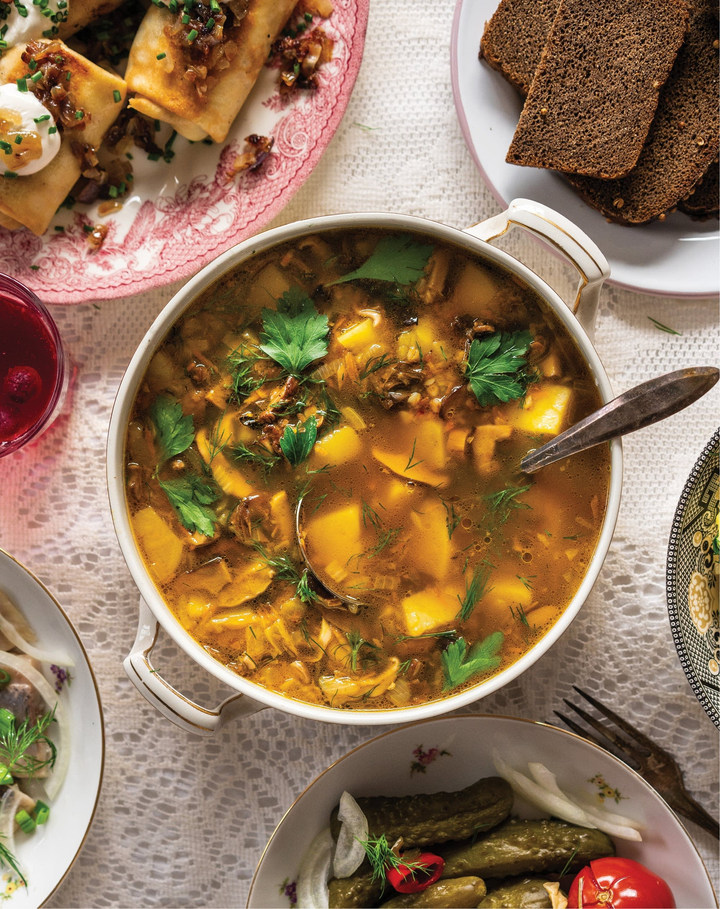
🥞 Syrniki (Slavic Cheese Pancakes)
A taste of a slow, cozy morning.
There is a special kind of magic in a Slavic kitchen, the ability to turn the humblest ingredients into pure comfort. And nothing says comfort quite like syrniki. These are not your typical fluffy pancakes; they are little clouds of sweet and tangy farmer's cheese (tvorog), held together with just a bit of flour and egg, then pan-fried in butter until golden and slightly crisp on the outside, with a soft, warm, curd-like center.
Served hot with a generous dollop of cold sour cream and a spoonful of berry jam, syrniki are the taste of childhood, of slow weekend mornings, and of a grandmother's love on a plate.
🌿 Ingredients
- 500g (about 2 cups) farmer's cheese (tvorog), as dry as possible
- 1 large egg
- 3-4 tablespoons all-purpose flour, plus more for dusting
- 2-3 tablespoons sugar (adjust to your sweetness preference)
- 1 teaspoon vanilla extract
- A pinch of salt
- Butter or neutral oil for frying
For Serving:
- Sour cream (smetana)
- Jam (varenye), honey, or maple syrup
- Powdered sugar
- Fresh berries
🔥 How to Make It
- Prepare the Cheese: The key to good syrniki is dry cheese. If your farmer's cheese seems wet, place it in a cheesecloth or a fine-mesh sieve and gently press out as much liquid (whey) as you can.
- Mix the Dough: In a medium bowl, combine the farmer's cheese, egg, sugar, vanilla extract, and salt. Mix well with a fork until everything is incorporated.
- Add the Flour: Sprinkle in 3 tablespoons of flour and mix until a soft, slightly sticky dough forms. Be careful not to add too much flour, or the syrniki will be tough and rubbery. The dough should just barely come together.
- Shape the Patties: Lightly flour your hands and a clean work surface. Scoop a heaping tablespoon of the cheese mixture and roll it into a ball. Gently flatten it into a small, thick disk, about 1-1.5 cm (½ inch) thick. Lightly dust each side of the patty with flour.
- Fry to Golden Perfection: Heat a generous knob of butter or a splash of oil in a skillet over medium heat. Once the butter is sizzling, carefully place the syrniki in the pan, leaving some space between them.
- Cook Slowly: Fry for 3-5 minutes on each side, until they are beautifully golden-brown and cooked through. Don't rush them on high heat, as the outside will burn before the inside is warm and soft.
- Serve Immediately: Syrniki are best served fresh and hot from the pan. Arrange them on a plate and serve with your favorite toppings.
🧙♀️ Notes from the Old World:
The soul of syrniki is the tvorog. A good, dry, full-fat farmer's cheese will make all the difference. Some grandmothers would add a handful of raisins (pre-soaked in hot water) or a bit of lemon zest to the dough for extra flavor. Don't be afraid if the dough is a bit sticky and tricky to work with; a light hand and a well-floured surface are your best friends. These are meant to be rustic and imperfect, a testament to the simple, heartfelt cooking of the old world.


